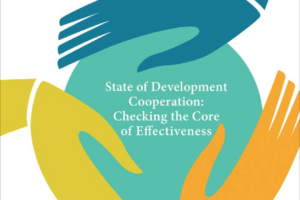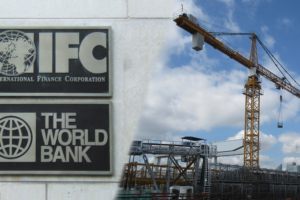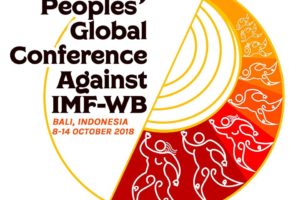A new book titled Lenin’s ‘Imperialism’ in the 21st Century answers in the affirmative. With eight chapters focusing on contemporary aspects of imperialism and monopoly capitalism, the book was launched in Manila by the Institute of Political Economy (IPE) with the co-operation of IBON International.
MNCs and Monopolies
[[{“type”:”media”,”view_mode”:”media_original”,”fid”:”1775″,”attributes”:{“alt”:””,”class”:”media-image”,”height”:”2793″,”style”:”font-size: 12px; width: 600px; height: 291px;”,”typeof”:”foaf:Image”,”width”:”5761″}}]]
Paul Quintos from the International League of Peoples' Struggle discusses contemporary monopolies and trends in global capital concentration. Photo: IBON International
Lenin’s basic insight on the concentration of capital into larger firms – a tendency towards monopolies – still haunts the supposed “free markets” of neoliberal globalisation. According to Paul Quintos, six multinational companies (MNCs) control 63 percent of the global seed market in terms of 2016 revenues. Similarly, only six companies control 20 percent of the USD 4.3 trillion market on information technology and consumer electronics; while ten pharmaceutical firms capture almost half of their sectors at 47 percent. Quintos was a speaker during the book launch and forum, and also an author in the new book.
“10 biggest corporations of the world are richer than 180 countries combined in terms of revenues. 147 firms actually control 40% of global wealth through interlocking ownership”, Quintos said, citing earlier studies. [1][2]Quintos clarified that the home countries of these firms remain in “the triad of imperialist powers (the U.S., E.U., and Japan)”; this “triad” accounts for 62 percent of the companies in Fortune’s annual Global 500 list.
Aid as a foreign policy instrument
On the other hand, Prof. Roland Simbulan described the role of official development assistance (ODA) and foreign military aid as instruments of global or imperialist powers. During the launch, he bemoaned how donor states – usually global powers as well – “give”aid not to assist in the development of recipient states and peoples, but with “strings attached” that serve donors’ foreign policy goals. On the other hand, according to Simbulan, the “ruling elites [are the ones that] can feel more secure” with foreign military aid, especially from the United States.
Views from the ground
[[{“type”:”media”,”view_mode”:”media_original”,”fid”:”1776″,”attributes”:{“alt”:””,”class”:”media-image”,”height”:”2353″,”style”:”font-size: 12px; width: 600px; height: 246px;”,”typeof”:”foaf:Image”,”width”:”5737″}}]]
Venezuelan Ambassador to the Philippines Capaya Rodriguez Gonzales reflects on the contemporaneity of Lenin, the political situation in Venezuela. Photo: IBON International
People’s organisations and honoured guests were also present to look at the book from different lenses. Representatives from the Kilusang Mayo Uno (May First Labour Movement) and Bagong Alyansang Makabayan (New Patriotic Alliance) in particular gave insights on the book.
Liza Maza, the Secretary of the National Anti-Poverty Commission (NAPC), reflected on how neoliberal policies and laws, and the reduced role of the state in delivering social services, became the bane for addressing poverty in the Philippines. Venezuelan Ambassador Capaya Rodriguez Gonzalez, on the other hand, shared the view that Lenin’s analysis is still relevant for our present era. She also denounced U.S. President Trump’s threats regarding economic sanctions against Venezuela.
Imperialism today
[[{“type”:”media”,”view_mode”:”media_large”,”fid”:”1772″,”attributes”:{“alt”:””,”class”:”media-image”,”height”:”320″,”style”:”font-size: 12px; width: 350px; height: 233px; float: right; margin: 5px;”,”typeof”:”foaf:Image”,”width”:”480″}}]]
Lenin’s 1917 work, titled Imperialism, the Highest Stage of Capitalism, described the rise of monopolies, a financial oligarchy, cartels; the increasing export of capital; and inter-country wars for resources and markets – all in the post-WWI era.
Today, the new IPE book sees imperialism persisting in the currently multipolar world. Aside from Quintos and Simbulan, the book features six other authors. Antonio Tujan Jr., Executive Editor of the IPE, tackles the U.S. and U.K.-led neoliberal globalisation since the 1970s, the 2008 crisis, and a possible debt crisis threatening the global South. Demba Dembele looks at imperialism in Africa, while Pao-yu Ching and Fred Engst each offer their take at the “challenge” of China to current global powers. Jun Verzola Jr. focuses on the militarist tendency of imperialism up to this day. Finally, Jose Maria Sison closes the book with “The Future of Imperialism and Socialism”.
Related: Read a review of the book in TeleSUR English here.
You can email i3d_bookshop@iboninternational.org to order “Lenin’s ‘Imperialism’ in the 21st Century” for P250 (USD 5) and the re-print of “Imperialism, the Highest Stage of Capitalism” for P100 (USD 2).
[1] Forbes. 2011. https://www.forbes.com/sites/bruceupbin/2011/10/22/the-147-companies-that-control-everything/#3c9951ce5105
[2] Global Justice Now. 2016. http://www.globaljustice.org.uk/news/2016/sep/12/10-biggest-corporations-make-more-money-most-countries-world-combined



